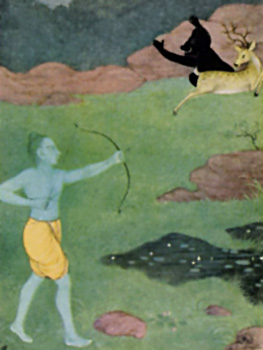 Death of Khara and the chopping of Surpanakha`s ears and nose by Rama enraged Ravana and he was determined to take revenge from the two brothers by abducting Rama`s wife, Sita. He, thus, planned to take revenge from them and summoned his most-trusted rakshasa Maricha and ordered him to go in the guise of a golden deer and deceive Rama and Lakshmana and take them far away from the hermitage.
Death of Khara and the chopping of Surpanakha`s ears and nose by Rama enraged Ravana and he was determined to take revenge from the two brothers by abducting Rama`s wife, Sita. He, thus, planned to take revenge from them and summoned his most-trusted rakshasa Maricha and ordered him to go in the guise of a golden deer and deceive Rama and Lakshmana and take them far away from the hermitage.
Ravana ordered Maricha to work according to the plan but Maricha advised him to stay his hand from attempting the impossible, and Ravana, being persuaded for that time, went home to Lanka. Ravana possessed twenty arms and ten heads and he sat on his golden throne like a flaming fire fed with sacrificial offerings. He was scarred with the marks of many wounds received in battle with the gods, of royal mien and gorgeously appareled was that puissant and cruel rakshasa.
His wont was to destroy the sacrifices of Brahmins and to possess the wives of others and was blessed not to be slain by gods or ghosts or birds or serpents. Then Surpanakha came to her brother and showed her wounds, and told him of Rama, Lakshmana and Sita, and taunted him for unkindly ways in that he took no revenge for the slaughter of his subjects and his brother; then she urged him to bring away Sita and make her his wife. So he took his chariot and fared along by the sea to a great forest to consult again with Maricha, who dwelt there in a hermitage practicing self-restraint.
Maricha counseled Ravana not to meddle with Rama. He told that if Rama, once angered, he would not leave a single rakshasa alive, or held his hand from destroying the beautiful city of Lanka. But Ravana was fey, and boasted that Rama would be an easy prey. He blamed Maricha for ill-will toward himself, and threatened him with death. Then Maricha out of fear consented, though he looked for no less than death from Rama when they should meet again. Then Ravana was pleased, and, taking Maricha in his car, set out for the hermitage of Rama, explaining the trick by following which they would be able to abduct Sita easily from the hermitage.



















